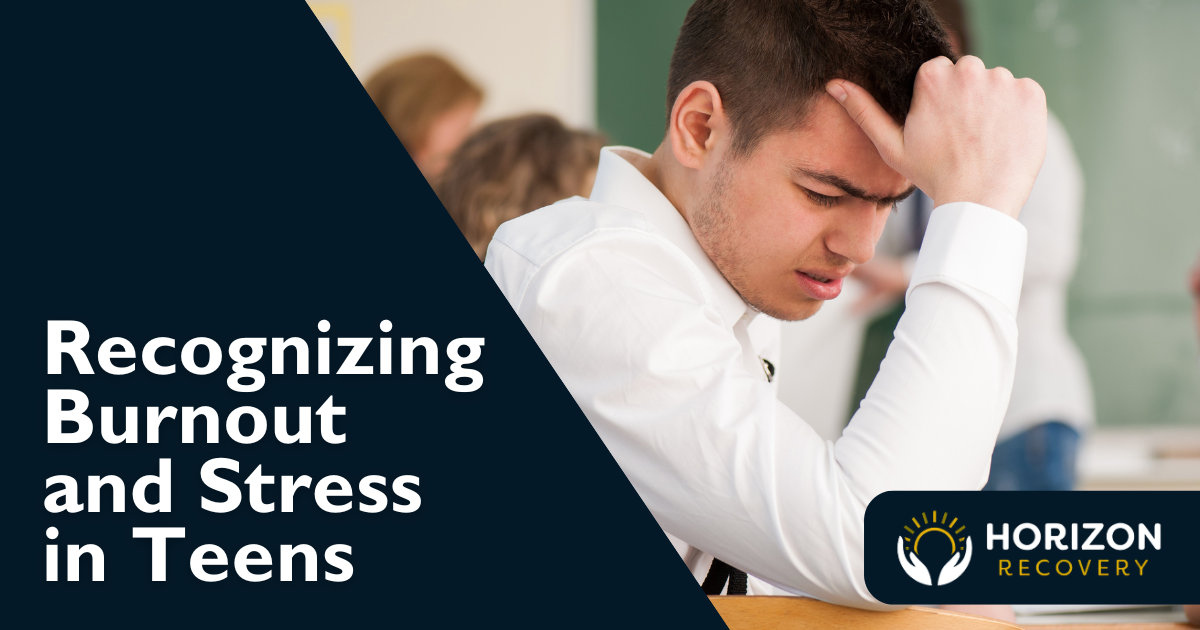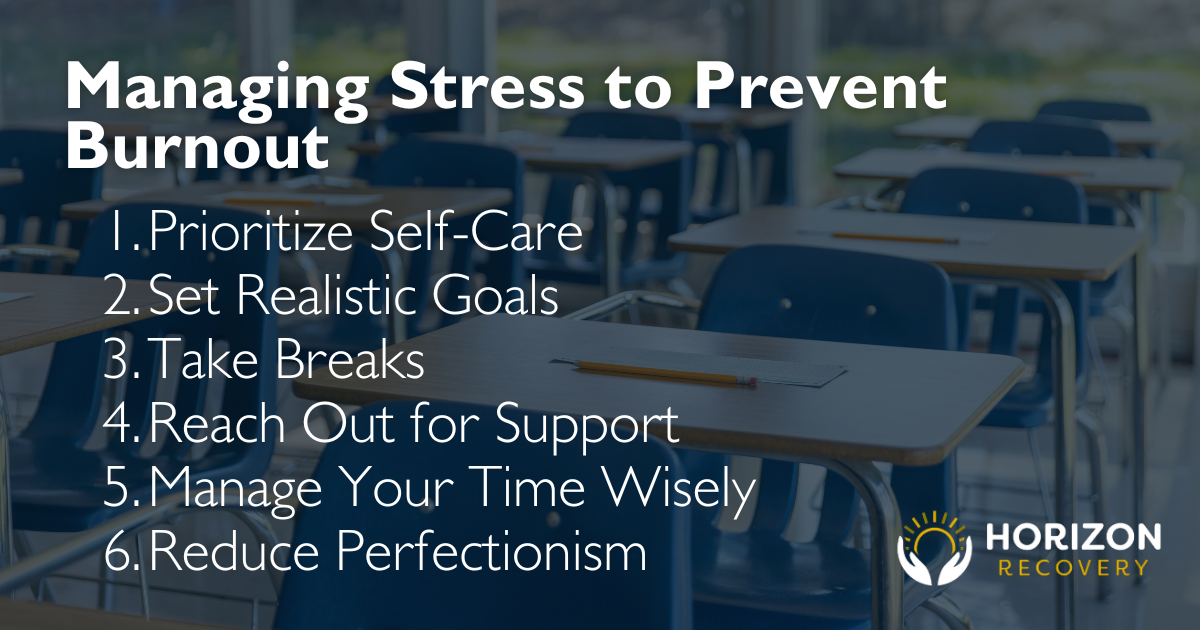
Horizon Recovery: Supporting Teens in Mental Health & Recovery

For many teenagers, school is a place of learning, friendships, and personal growth. But with academic pressures, extracurricular commitments, and social expectations, school can also become a major source of stress.
If you find yourself feeling exhausted, unmotivated, or emotionally drained, you may be experiencing school burnout. Understanding the early signs of school burnout in teenagers is crucial to managing stress before it takes a toll on your mental health.
Executive Perspectives:
Brian Carlisle, RN, FNP-C, MSLE Administrator | Horizon Recovery “Throughout my career responding to teen mental health emergencies, I’ve observed that school burnout often masks itself as typical teenage behavior—irritability, withdrawal, fatigue—yet these subtle signals represent a silent cry for help that parents and educators can learn to recognize before exhaustion deepens into something more serious.”
Patrick Buehl Executive Director | Horizon Recovery “Teens experiencing burnout often shoulder their struggles in isolation, mistaking overwhelming pressure for personal inadequacy; at Horizon Recovery, we create safe spaces where young people can release this burden of perfectionism and discover their inherent worthiness beyond academic performance or productivity.”
What Is School Burnout?
Burnout is more than just feeling tired after a long school day. It happens when stress becomes overwhelming and persistent, making it hard to focus, stay motivated, or even enjoy things you once loved.
What school burnout feels like for teens can vary from person to person, but common symptoms include emotional exhaustion, physical fatigue, and a sense of detachment from schoolwork and responsibilities.

Early Signs of School Burnout in Teenagers
Burnout often builds up over time, so it’s important to recognize the early warning signs before it worsens.
Here are some indicators that school stress might be affecting your well-being:
- Constant Exhaustion
- Do you wake up feeling drained, no matter how much sleep you get?
- Do you often ask yourself, “Why do I feel exhausted after school every day?”
- Feeling physically and mentally tired all the time is a key sign of burnout.
- Lack of Motivation
- Tasks that once excited you now feel like a burden.
- You struggle to start assignments or procrastinate more than usual.
- You feel disconnected from your academic goals.
- Frequent Headaches or Stomachaches
- Stress can show up as physical symptoms.
- If you often feel unwell before school or during high-pressure situations, your body may be reacting to stress.
- Difficulty Concentrating
- You find it hard to focus in class or while doing homework.
- You reread the same paragraph multiple times without processing it.
- You space out during lessons, even if you’re trying to pay attention.
- Increased Irritability or Mood Swings
- You feel frustrated or overwhelmed by small things.
- You get annoyed easily by teachers, friends, or family members.
- You feel emotionally drained but don’t know why.
- Declining Academic Performance
- Even if you try your best, your grades start slipping.
- You find it hard to retain information for tests.
- You feel anxious about failing, but can’t seem to keep up.
- Withdrawal from Friends and Activities
- You no longer enjoy hobbies or time with friends.
- You’d rather stay in bed than engage with others.
- Socializing feels exhausting instead of energizing.
- Changes in Sleep Patterns
- You either sleep too much or not enough.
- You have trouble falling asleep or staying asleep due to stress.
- You wake up feeling unrested no matter how long you sleep.
- Increased Anxiety and Overthinking
- You constantly worry about school, grades, or the future.
- You feel overwhelmed by deadlines and responsibilities.
- You overanalyze conversations or feel like you’re always under pressure.
- Feeling Emotionally Numb or Detached
- You feel like you’re just going through the motions.
- You don’t feel excitement or joy, even when good things happen.
- You feel disconnected from your emotions and don’t know why.
How Do I Know If I’m Too Stressed from School?
It’s normal to feel stressed sometimes, but how to tell if stress is affecting your mental health as a teen comes down to recognizing when stress becomes too much. Ask yourself:
- Do I feel overwhelmed more often than not?
- Is stress interfering with my ability to focus, sleep, or enjoy life?
- Am I constantly anxious, sad, or exhausted?
- Do I feel like I’m drowning in responsibilities with no way to cope?
If you answered “yes” to these questions, it may be time to take a step back and address your stress levels.
How to Manage School Stress and Prevent Burnout
If you’re feeling burned out, don’t ignore it. Here are ways to relieve stress and regain balance:
1. Prioritize Self-Care
- Get enough sleep—your brain needs rest to function well.
- Eat nutritious meals and stay hydrated.
- Exercise or go for a walk to release built-up tension.
2. Set Realistic Goals
- Break tasks into smaller steps instead of trying to do everything at once.
- Set achievable goals to avoid feeling overwhelmed.
3. Take Breaks
- Schedule short breaks while studying to avoid burnout.
- Do something relaxing, like listening to music or stretching.
4. Reach Out for Support
- How to start a conversation with a teacher about mental health: If you’re struggling, let a trusted teacher know. They may offer extensions or advice.
- Tips for talking to parents about your feelings as a teen: Be honest and let them know what you’re going through. It’s okay to ask for help.
- Can I talk to a coach about my mental health? Yes! Coaches, school counselors, and mentors can be great sources of support.
5. Manage Your Time Wisely
- Use a planner to track assignments and deadlines.
- Set aside specific times for homework and relaxation.
6. Reduce Perfectionism
- Understand that no one is perfect—trying your best is enough.
- Learn to accept mistakes as part of learning.

When to Seek Professional Help
If your stress is leading to persistent sadness, anxiety, or exhaustion, professional support might be necessary. Therapy can provide tools to manage stress effectively.
How to tell if a counselor or therapist is a good fit for a teenager: Find someone who listens, respects your feelings, and makes you feel comfortable opening up.
Horizon Recovery Can Help with Burnout and Stress in Teens
If school feels overwhelming and you’re constantly stressed, know that you’re not alone. Many teens experience burnout, and there are ways to manage it. If stress is interfering with your happiness and daily life, reaching out for help is a sign of strength.
At Horizon Recovery, we understand the challenges teens face with school stress and mental health. If you’re feeling overwhelmed and need support, we’re here to help. Contact us today to explore ways to regain balance and feel like yourself again. You deserve support, and we’re ready to provide it.
Reviewed By: Trusted Teen Mental Health Specialists
This article has been reviewed by experienced professionals in adolescent mental health treatment to ensure accuracy, clinical relevance, and compassionate care.
Brian Carlisle, RN, FNP-C, MSLE
Administrator | Horizon Recovery
Brian Carlisle brings over 15 years of experience as a Phoenix Fire Department Captain/Paramedic, specializing in emergency adolescent mental health crises. As a Family Nurse Practitioner (FNP-C) and Administrator of Horizon Recovery, he integrates medical expertise with a deep understanding of crisis intervention. His Master’s in Business Leadership and Ethics helps shape evidence-based treatment programs that prioritize both clinical excellence and compassionate care. His firsthand experience with mental health struggles among first responders fuels his mission to create supportive, transformative environments for teens and their families.
Patrick Buehl
Executive Director | Horizon Recovery
With over 30 specialized certifications in behavioral health, Patrick Buehl serves as Executive Director of Horizon Recovery, overseeing comprehensive adolescent treatment programs. His personal journey through mental health challenges informs his empathetic leadership approach, ensuring that every treatment plan is rooted in evidence-based therapeutic practices. He remains actively engaged with clients, families, and staff, working closely with clinical experts to deliver holistic, individualized care that supports long-term recovery and well-being for teens.
More posts like this
.svg)
Guiding your teen’s path to mental clarity, sobriety, and a hopeful future.
For more information or to schedule a visit, please reach out to us today. Our empathetic and caring team is here to support you every step of the way.
.svg)
.avif)
.svg)
.svg)



